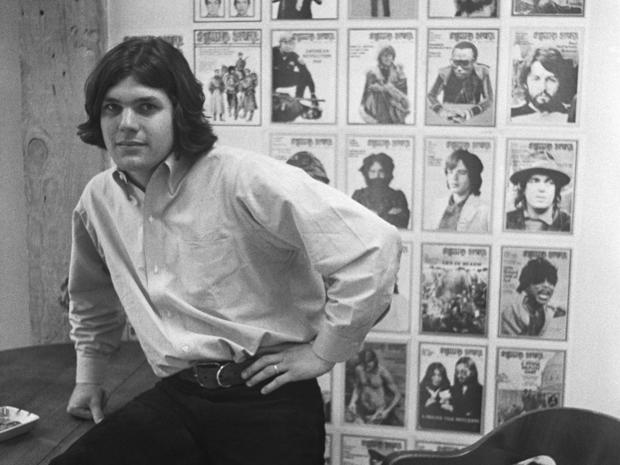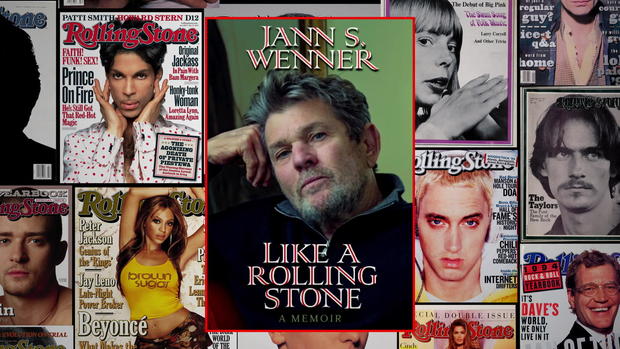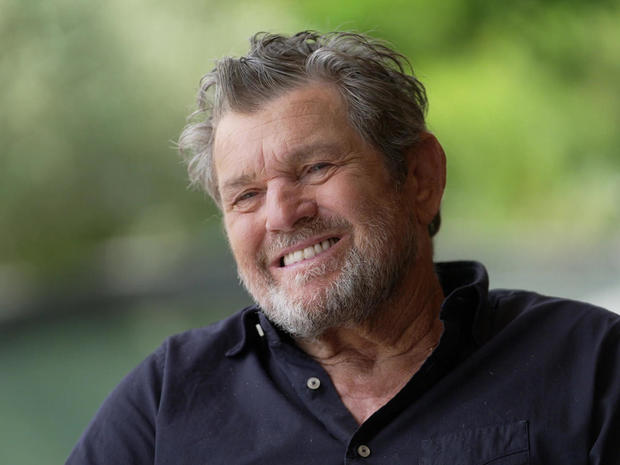In his new memoir Jann Wenner relives Rolling Stone's "glory days"
Jann Wenner scoured the archives of the magazine he founded for his new memoir. "Like a Rolling Stone" (published September 13 by Little, Brown) is his account of creating what became the cultural Bible for baby boomers.
Correspondent Anthony Mason asked Wenner, "In the beginning, it sounds like you didn't really have a plan, a budget even?"
"No, we were doing it kind of day-to-day, week-to-week, and then we advanced to month-to-month. It took a while to go from year-to-year!"
A 21-year-old Berkeley dropout, Wenner launched Rolling Stone in the "Summer of Love," 1967.
The name was suggested by Wenner's mentor, Ralph Gleeson, hipster music critic of the San Francisco Chronicle. "He was kind of, you know, a conscience. He was a moral conscience."
Gleason also had the idea for Rolling Stone's first big scoop. He heard that John Lennon and Yoko Ono were releasing a new album, "Two Virgins,' but their label had rejected a cover photo of the couple fully naked.
"So, Ralph said, 'Why don't you write to them and suggest that we'll publish it?'" Wenner recalled. "Okay. So, I wrote them a letter, and then within two weeks a mailing tube comes back from England, and it's got the 'Two Virgins' pictures in it. And it's dynamite."
"I love that they just arrive in a mailing tube," said Mason.
"What are they called – the family jewels arrived!" Wenner laughed.
"Did you hesitate at all about publishing it?"
"No. Not for a second."
Rolling Stone ran it as a center spread. "That was our first anniversary issue, and the first time we ever got any type of press, or coverage, or notice was publishing those pictures."
Suddenly, the magazine was on the cultural map. Mick Jagger reached out. "He said we should publish Rolling Stone together in England. I said, 'Of course, you know, why not? You know, what do you want to do? I'll do it,'" Wenner laughed.
It didn't work out too well. "It lasted about a half-a-year. Mick had one idea for what it should be like, I had another idea for it."
Wenner quickly shut it down. "He was a total gentleman about it."
But their friendship would be challenged in 1969, when a fan was stabbed to death during the Rolling Stones' closing set at the Altamont Festival. The magazine gave 17 pages of coverage to Altamont.
"Yeah, it was a huge story, and it was right in our backyard," Wenner said.
The magazine called it "rock and roll's all-time worst day"
- The Rolling Stones disaster at Altamont: Let it bleed (Jan. 21, 1970)
Wenner said, "There were many people to blame for that. And the Stones certainly were one of them."
"You call it a defining moment for the magazine," said Mason. "Were you gonna back your friends, or were you gonna tell the truth?"
"You have to tell the truth."
Jagger sent Wenner a telegram: "We no longer trust you to quote us fully or in context. I hope our friendship can flourish again one day."
It wasn't the only critical mail Wenner would receive. Outraged by a nasty review, Roger Taylor, of Queen, slammed the "outdated, opinionated, down-home rag."
Wenner said, "He sent us a letter to the editor really angry, but he wrote it out on a barf-bag from an airplane!"
"I love that touch!" Mason laughed.
"You gotta love that. He's a man of style!"
As Rolling Stone grew, Wenner put together a roster of irreverent writers, including Tom Wolfe and Dr. Hunter S. Thompson, who said in 1987, "With Rolling Stone, I was given the room and the range to really kick ass."
Wenner remembers the day the godfather of gonzo journalism first walked into his office with a satchel: "And out of the satchel he starts pulling these cartons of cigarettes, and TarGard lighters, and flashlight batteries, and road flares." Road flares?
"And then finally pulls out this kind of siren thing. He sticks it on my desk and he turns on (ARRRAAAA!!!!!!) and everything. That's my introduction to Hunter. And then, he talked for two hours.
"Hunter was really the great mad genius of Rolling Stone, and became kind of the soul of Rolling Stone for a long time."
For the first 27 years that he ran the magazine, the married Wenner kept a secret – that he was gay.
Mason asked, "I'm curious, because rock 'n' roll was not particularly open to homosexuality."
"No, not at all."
"Did that worry you?"
"Not really."
"How did you deal with it?"
"You just shut up," Wenner said. "You keep it quiet. You keep it to yourself, you know? You pretend you're not. And you could learn to get adjusted to that, I think, that way of life."
Then in 1994, he met fashion designer Matt Nye, and split with his wife, Jane.
"But telling her couldn't have been easy?" asked Mason.
"It never is. Not that, divorce, anything like that. But, it all worked out. My wife now lives down the road here, not 10 minutes away. And they're two combined families – my husband now, Matt, and my wife then, Jane. They're easier about it than I am!"
"You're caught in the middle?"
"Yeah, well they have something mutual to complain about!" Wenner laughed.
Wenner and Nye now live in Montauk with their three kids. It's where Wenner recuperated recently after a serious health scare.
Mason said, "You went through hell there for a few years."
"I had a heart attack, a broken leg, three back operations, infected in there. I had four eye operations," Wenner said. "It was more than enough."
"What were you thinking in the middle of all that?"
"You learn a lot about yourself when you face that kind of experience, that kind of near-death," he replied.
What'd you learn? "How precious life is. How lucky you are to still be alive. How important it is to have friends and family."
When Wenner and Mason last met in 2017, Wenner's son, Gus, had taken over day-to-day editing of the magazine, which they had put up for sale.
A few months later, Penske Media bought Rolling Stone. Gus was asked to stay; his father was not.
"It was time to get out for me," said Wenner. "You know, I had seen the glory days. It was probably one of the greatest magazines of our time, arguably."
"But from the way you describe it, it wasn't easy letting go."
"Yeah, it was difficult at first, the transition of – well, I'd thought I'd still be in charge, you know? Or at least they would come to me for what to do and would ask my opinions about things. And the only difficult part was establishing, realizing that they weren't! And that more than anybody, the person that didn't really wanna come to me all the time was my son, you know? He was tired of being told what to do!"
Mason said, "One of the things you said to me when we talked in 2017 was, 'Why would anybody want Rolling Stone without me?'"
"Yeah, well, now we know!" laughed Wenner. "Is it as good without me? Of course not! But, it's very good. And I had the best of times."
READ AN EXCERPT: "Like a Rolling Stone" by Jann Wenner
For more info:
- "Like a Rolling Stone: A Memoir" by Jann S. Wenner (Little, Brown and Co.), in Hardcover, eBook and Audio formats, available September 13 via Amazon, Barnes & Noble and Indiebound
- Jann Wenner, Wenner Media
- rollingstone.com
Story produced by Sara Kugel. Editor: Steven Tyler.






